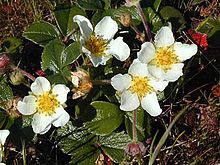This is an old revision of this page, as edited by Ketiltrout (talk | contribs) at 01:49, 15 March 2016 (dab). The present address (URL) is a permanent link to this revision, which may differ significantly from the current revision.
Revision as of 01:49, 15 March 2016 by Ketiltrout (talk | contribs) (dab)(diff) ← Previous revision | Latest revision (diff) | Newer revision → (diff)
| Fragaria chiloensis | |
|---|---|

| |
| Scientific classification | |
| Kingdom: | Plantae |
| (unranked): | Angiosperms |
| (unranked): | Eudicots |
| (unranked): | Rosids |
| Order: | Rosales |
| Family: | Rosaceae |
| Genus: | Fragaria |
| Species: | F. chiloensis |
| Binomial name | |
| Fragaria chiloensis (L.) Mill. | |
Fragaria chiloensis, the beach strawberry, Chilean strawberry, or coastal strawberry, is one of two species of strawberry that were hybridized to create the modern garden strawberry (F. × ananassa). It is noted for its large berries. Its natural range is the Pacific Ocean coasts of North and South America, and also Hawaiʻi. Migratory birds are thought to have dispersed F. chiloensis from the Pacific coast of North America to the mountains of Hawaiʻi, Chile, and Argentina.

It is an evergreen plant growing to 15–30 centimetres (5.9–11.8 in) tall, with glossy green trifoliate leaves, each leaflet around 5 centimetres (2.0 in) long. The flowers are white, produced in spring and early summer. The fruit is edible, red on the surface, white inside.
Its fruit is still sold as a local delicacy in some South American produce markets.
Amédée-François Frézier (1682–1773) was the first to bring back specimens of Fragaria chiloensis to the Old World.
Chaetosiphon fragaefolii, the strawberry aphid, is a bug species found feed on F. chiloensis in Chile. It is a vector of the strawberry mild yellow-edge virus.
Subspecies
There are a number of subspecies and forms:
- Fragaria chiloensis subsp. chiloensis forma chiloensis
- Fragaria chiloensis subsp. chiloensis forma patagonica (Argentina, Chile)
- Fragaria chiloensis subsp. lucida (E. Vilm. ex Gay) Staudt (coast of British Columbia, Washington, Oregon, California)
- Fragaria chiloensis subsp. pacifica Staudt (coast of Alaska, British Columbia, Washington, Oregon, California)
- Fragaria chiloensis subsp. sandwicensis (Decne.) Staudt - ʻŌhelo papa (Hawaiʻi)
-
 Fragaria chiloensis subsp. chiloensis forma chiloensis
Fragaria chiloensis subsp. chiloensis forma chiloensis
-
 Beach strawberry at Pacifica State Beach, San Mateo County, California.
Beach strawberry at Pacifica State Beach, San Mateo County, California.
Genetics
All strawberries have a base haploid count of 7 chromosomes. Fragaria chiloensis is octoploid, having eight sets of these chromosomes for a total of 56. These eight genomes pair as four distinct sets, of two different types, with little or no pairing between sets. The genome composition of the octoploid strawberry species has generally been indicated as AAA'A'BBB'B'. The A-type genomes were likely contributed by diploid ancestors related to Fragaria vesca or similar species, while the B-type genomes seem to descend from a close relative of Fragaria iinumae. The exact process of hybridization and speciation which resulted in the octoploid species is still unknown, but it appears that the genome compositions of both Fragaria chiloensis and Fragaria virginiana (and by extension the cultivated octoploid strawberry as well) are identical.
References
- Sauer, Jonathan D. (1993). Historical Geography of Crop Plants: A Select Roster. CRC Press. pp. 128–129. ISBN 0-8493-8901-1.
- Genetic Structure of the Aphid, Chaetosiphon fragaefolii, and Its Role as a Vector of the Strawberry yellow edge virus to a Native Strawberry, Fragaria chiloensis in Chile. Blas Lavandero, Pamela Rojas, Claudio C. Ramirez, Marcela Salazar and Peter D.S. Caligari, J Insect Sci., 2012, volume 12, page 110, doi:10.1673/031.012.11001, PMC 3605023
External links
- Jepson Manual Treatment - Fragaria chiloensis
- USDA Plants Profile
- Fragaria chiloensis - Photo gallery
- Fragaria chiloensis information from the GRIN Taxonomy Database
| Strawberries | ||
|---|---|---|
| Species |
|  |
| Strawberry cultivars | ||
| Breeders | ||
| Dishes | ||
| Pest and diseases | ||
| See also | ||